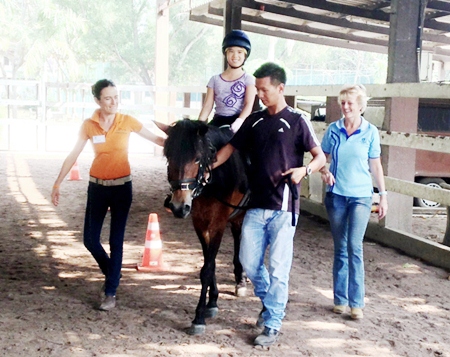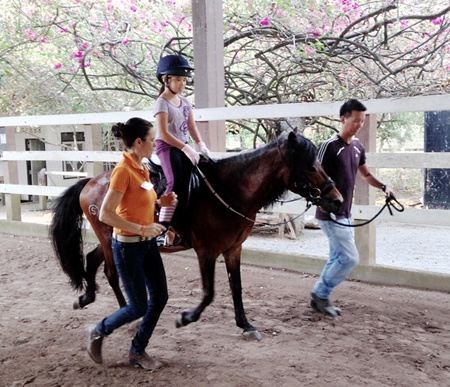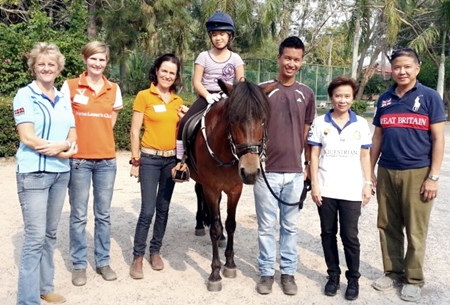Horse Lovers Club
Many disabled people benefit from riding, some from the therapy it gives, others by actually learning to ride. The benefits can be enormous and wide-ranging. They include improvements to balance, co-ordination, muscle tone, concentration and behavior. The riders may benefit from the necessary discipline, respond to requests, overcome fears, learn trust and interact socially with their helpers and their peers, developing an increase in confidence and self-esteem.
The horse moving naturally in walk simulates and synthesizes a movement as close to the human walk as is possible. This movement is used as a treatment base.
 The rider, Herb, is being taught how to pull her reins from right to left using coloured reins. This will teach her how to steer her own pony through cones.
The rider, Herb, is being taught how to pull her reins from right to left using coloured reins. This will teach her how to steer her own pony through cones.
Each rider is taught on the basis of their own individual needs and goals within a group lesson aided by the volunteers. The movement and the warmth of the horse encourages relaxation, stimulates the function of the internal organs and digestive tracts. The riders develop balance and learn to position themselves to accommodate the pony’s movement. In time co-ordination and communication may be developed and improved. It can offer the opportunity for physically and otherwise challenged people to experience mobility on a par with their able bodied peers.
Horse Lovers
Club – in training
Throughout Thailand many riding clubs are starting to understand the huge benefits of Equine Assisted Therapy. Recently, Horse Lovers Club in Bangkok, along with instructors from Thai Polo & Equestrian Club, have been attending training & coaching from riding therapist Sandra Cooper at Horseshoe Point Pattaya. Sandra has trained and helped qualify riding instructors and volunteers for many years in Malaysia, now living in Thailand, a qualification system will be implemented by the end of 2013. A log book for qualifications will be acquired from the UK and adapted for Thailand.
 Rider Herb is learning to kick her pony forward into trot. Herb can already do rising trot but needs to learn to give the correct aids to do this herself from walk to trot.
Rider Herb is learning to kick her pony forward into trot. Herb can already do rising trot but needs to learn to give the correct aids to do this herself from walk to trot.
Horse Lovers Club have been learning how to set up a safe environment for their therapy classes. Finding suitable quiet ponies/horses takes time and training to teach them to cope with this therapy which is most important. Training is taught on mounting and dismounting all disabilities as their needs are very different. How to work and fix a programme with disabilities such as Autism, Downs Syndrome and Cerebral Palsy which are the most common disabilities we face.
 (L to R) Sandra Cooper (riding therapist), Charlotte Weber, riding coach and instructor, Angela Navaraj, riding coach and instructor, Herb riding Tiffi, Akkasit Tiatrakul, riding coach and instructor (SEA Games gold medalist for Thailand), Vaewratt Kamonkon (owner of Horse Lovers Club Bangkok), and Suvich Prechaharn (father of Herb).
(L to R) Sandra Cooper (riding therapist), Charlotte Weber, riding coach and instructor, Angela Navaraj, riding coach and instructor, Herb riding Tiffi, Akkasit Tiatrakul, riding coach and instructor (SEA Games gold medalist for Thailand), Vaewratt Kamonkon (owner of Horse Lovers Club Bangkok), and Suvich Prechaharn (father of Herb).
On February the 11th and 26th 2013 Horse Lovers Club experienced working in a class situation and how to lead therapy horses correctly. If you would like further information on how to attended these courses, or would like to volunteer at Horseshoe Point Pattaya or Horse Lovers Club in Bangkok, please contact Riding Therapist Sandra Cooper on 0868483684 Pattaya or Angela Navoraj 0816460847.




